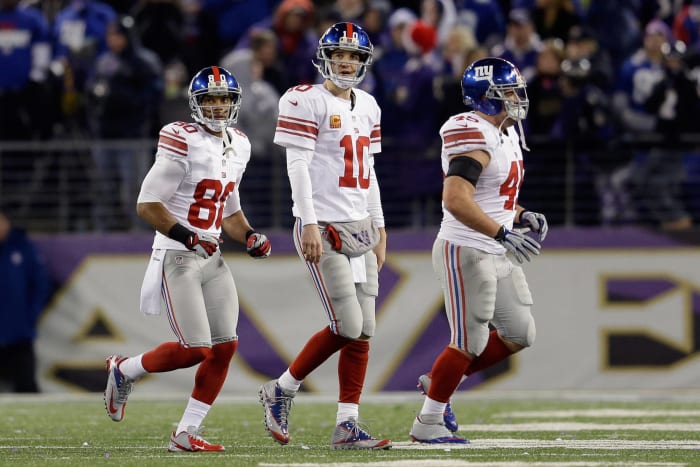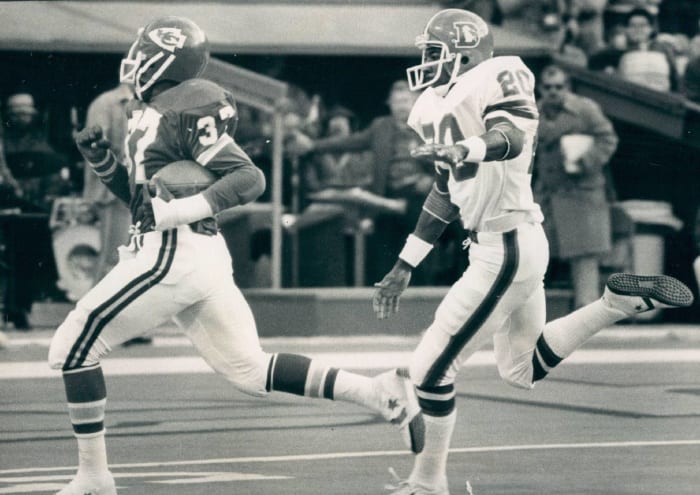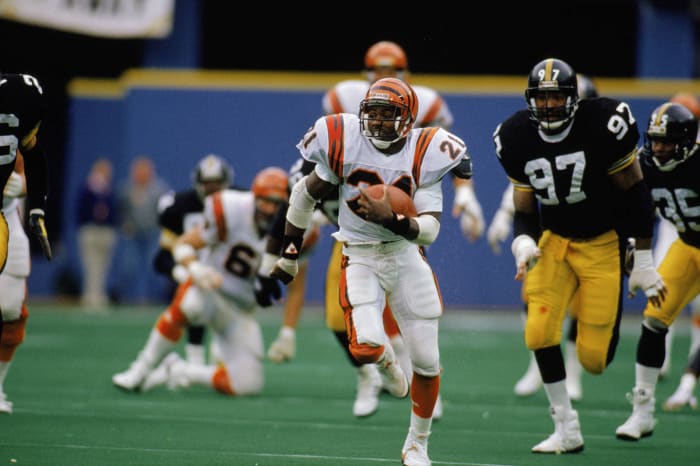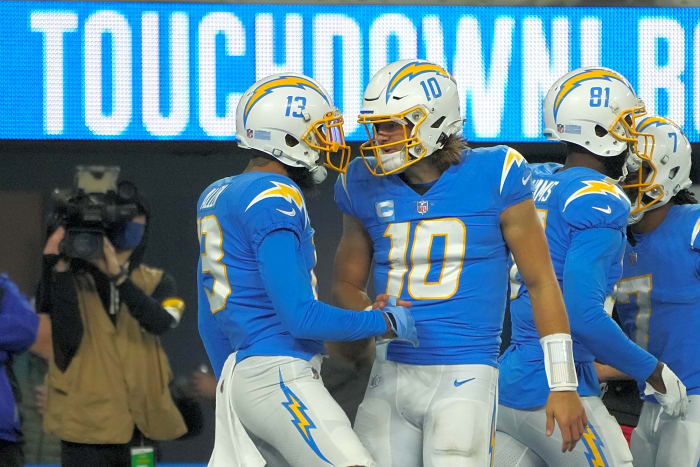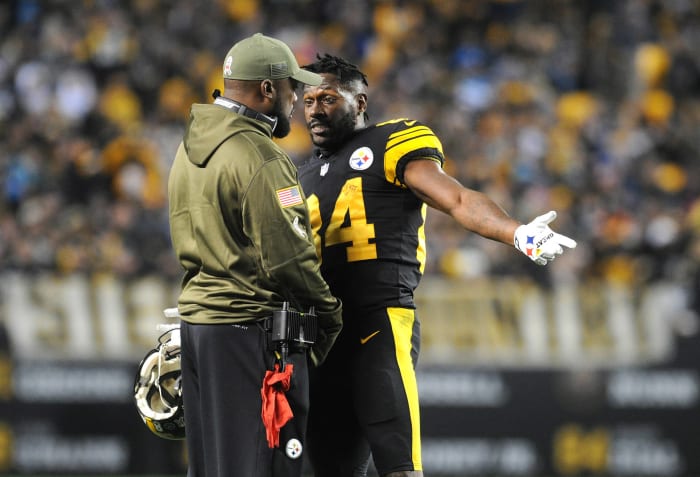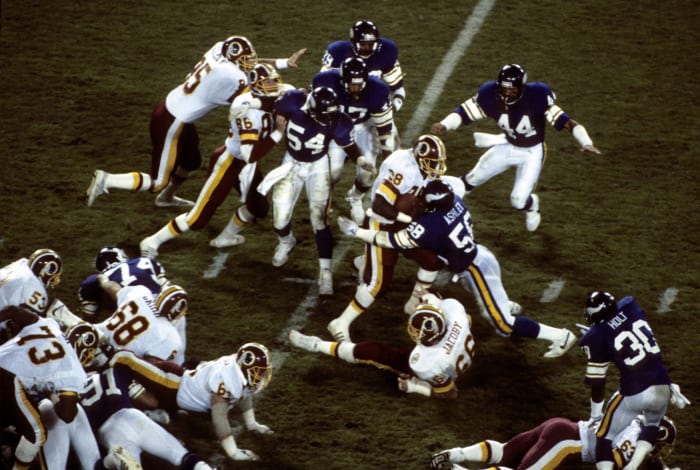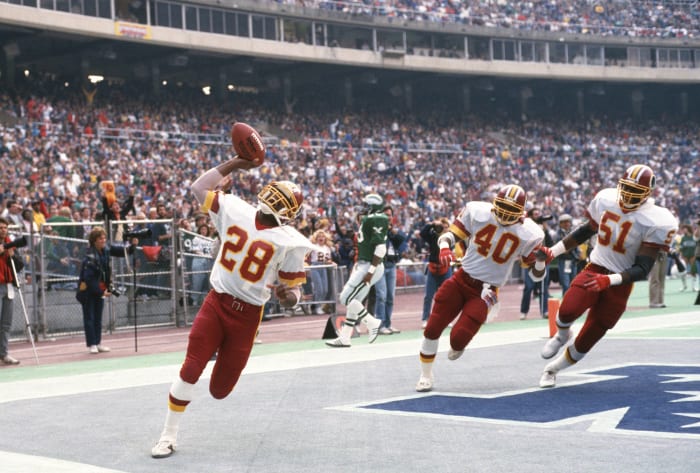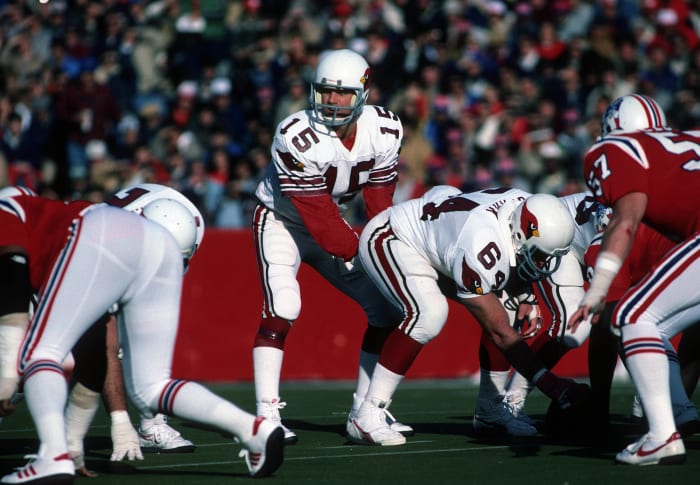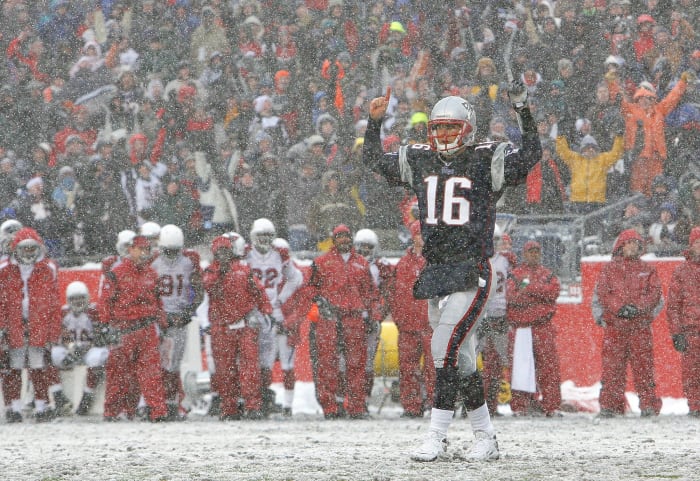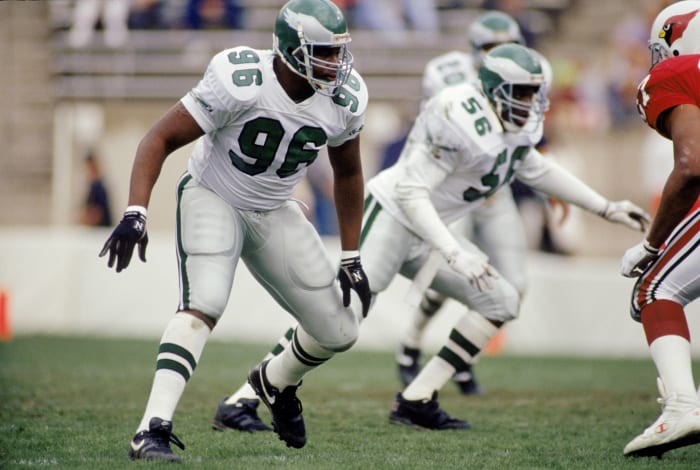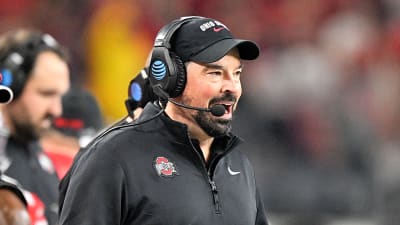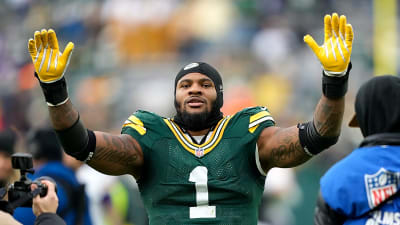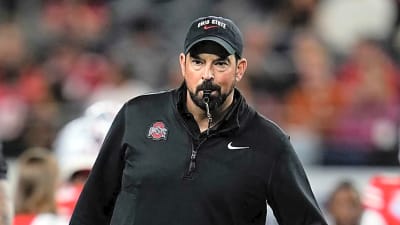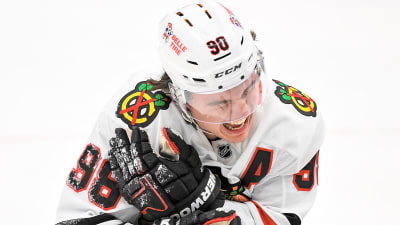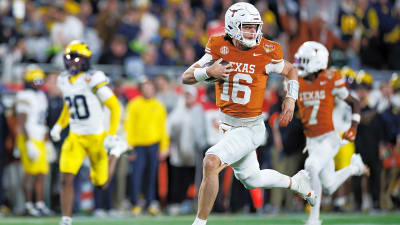In ascending order, here are the best teams to fall short of postseason play from the 10-team period (1978-89), the 12-team bracket era (1990-2019) and the current 14-team field.
Getty Images
Although these Giants had a better DVOA figure than the 2011 champions did, a 9-7 season started a swoon that ended with Tom Coughlin's departure three years later. Despite a plus-85 point differential and the No. 6 offense, these Giants bungled their playoff chances with December blowout losses to the Falcons and Ravens. Earlier that year, Big Blue pasted the NFC champion 49ers (26-3) and the No. 3-seeded Packers (38-10). Eli Manning and Victor Cruz made the Pro Bowl, but injuries caught up with Hakeem Nicks. And none of the Giants' feared pass rushers totaled more than 6.5 sacks.
Dave Buresh-Getty Images
Chiefs history montages generally gloss over the period between 1971's double-overtime playoff loss and Marty Schottenheimer's 1989 hire. But 1981 brought a mini-resurgence. The Chiefs featured a potential superstar in rookie running back Joe Delaney, who nearly led them to the playoffs. The electric runner set a then-Chiefs record with 1,121 rushing yards, but a late-season injury to starting quarterback Bill Kenney halted Marv Levy's team. The 9-7 Chiefs were 8-5 prior to Kenney's setback. Kansas City tragically had Delaney for only one more season; he drowned attempting to save children in 1983.
Rick Stewart-Getty Images
In a historic display of parity/mediocrity, the AFC in 1989 featured eight teams with eight or nine wins. The Bengals' 8-8 showing epitomized this odd season best. They went 5-1 in an AFC Central division that produced three playoff teams. They swept the Browns and Steelers -- who both won playoff games that year -- and immolated the Oilers 61-7 in December but lost to five non-playoff teams. Boomer Esiason and running back James Brooks ventured to the Pro Bowl, and the defending AFC champions/last-place team outscored the opposition by 119 points — more than every AFCer besides '89 conference champ Denver that year.
Kirby Lee-Imagn Images
The Chargers became the first AFC team since the '89 Bengals to deploy a Pro Bowl QB1 (Justin Herbert) and miss the playoffs. Herbert fired 38 TD passes, as the Bolts' Keenan Allen-Mike Williams duo shined, but new HC Brandon Staley's defensive background did not elevate that unit. The Bolts (9-8) beat four playoff teams, including the Chiefs and Bengals, but a December loss to the rebuilding Texans stung. A Week 18 scenario would have seen both the Bolts and Raiders book playoff berths with a tie. Despite Herbert artistry pushing that game to overtime, Las Vegas nixed that outcome with a game-winning field goal on the extra period's final play, benefiting a middling Steelers team.
Derik Hamilton-USA TODAY Sports
The Chip Kelly-Nick Foles partnership did not electrify like it did in 2013, when Foles posted a 27-2 TD-INT ratio. But these Eagles went 10-6 and accomplished this despite eight Mark Sanchez starts. Sanchez actually led the Eagles to 20-plus-point routs of the playoff-bound Cowboys and Panthers, while Foles piloted the Birds to a 5-2 start before breaking his collarbone. Four of the Eagles' six losses came against playoff teams, and Kelly's offense ranked third in scoring — Sanchez's involvement notwithstanding. The Kelly-Philly relationship dissolved a year later, however.
Phillip G. Pavely-USA TODAY Sports
Maddeningly inconsistent? Yes. But this would have been a dangerous, albeit volatile, playoff team. Ben Roethlisberger led the NFL in passing, with Antonio Brown scoring 15 TDs and wingman JuJu Smith-Schuster posting 1,426 yards. Amid Le'Veon Bell's season-long holdout, James Conner made the Pro Bowl. The 9-6-1 Steelers beat the Super Bowl champion Patriots in December before waging a shootout in New Orleans. Pittsburgh also led the NFL in sacks. Letdown losses in Denver and Oakland sank the Steelers, who saw Brown's career unraveling officially launch during a Week 17 practice. A close Ravens win over the Browns gave them the AFC North title and ended the Killer B's era.
Wally McNamee-Getty Images
Probably the strangest case on this list, Washington saw a since-changed tiebreaker procedure deny a playoff spot. Washington entered its season finale at 10-5 but essentially assured of a postseason berth because of a big lead on Chicago in net points. But Roger Staubach's final comeback stunned Washington, giving the Cowboys the NFC East title. A Bears team that scored fewer than 30 points in all but one prior game also beat the Cardinals 42-6, catapulting Chicago in by four points (plus-57 to Washington's plus-53). The NFL soon reorganized its tiebreaker hierarchy, too late for Jack Pardee's team.
Joe Camporeale-Imagn Images
The Colts continued their QB carousel by going from a retired Philip Rivers to ex-Frank Reich Eagles pupil Carson Wentz. A seven-Pro Bowler roster supplemented the middling passer, who played fairly well (27-7 TD:INT ratio). This septet included rushing champ Jonathan Taylor and first-team All-Pros Quenton Nelson and Shaq Leonard. The Colts routed the Bills and beat the playoff-bound 49ers, Cardinals and Patriots. This resume/talent combo still failed a 9-8 team (with a top-10 offense and defense). A late-season Wentz COVID-19 bout helped key a stunning Colts stumble that involved a Week 18 loss to the woeful Jaguars as two-touchdown favorite s. Jim Irsay mandated Wentz be traded soon after.
Getty Images
The '04 Bills, in all-time hideous uniforms , came close to snapping what became a 17-year playoff drought. Led by All-Pro Takeo Spikes and Pro Bowlers Nate Clements and Sam Adams, that Buffalo defense grades as Football Outsiders' No. 5 unit over the past 35 years. It forced an NFL-best 39 turnovers and keyed a six-game win streak that lifted Buffalo to 9-6. Drew Bledsoe's final Bills team blew a win-and-in opportunity against the 14-1 Steelers, who rested Ben Roethlisberger. Buffalo didn't return to the playoffs until 2017 -- five head coaches and seven primary QB1s later.
Ray Carlin-Icon Sportswire
This season included the following: the Bears scoring nine defensive TDs, Charles Tillman's "Peanut Punch" forcing 10 fumbles and Brandon Marshall setting the team's single-season receiving record (1,508 yards). Chicago finished 10-6 (plus-98) but placed third in the NFC North despite a 7-1 start. In a transcendent IDP fantasy cornerback season, Tillman also returned three INTs for scores for a Bears defense that boasted by far the No. 1 DVOA figure. While the Bears beat the playoff-bound Colts, they lost to five playoff teams in November and December and could not recover. Lovie Smith was fired at season's end.
Michael J. Minardi-Getty Images
Seven NFC teams finished with at least 10 wins in 1989; one AFCer (the Broncos) did so. These Saints were 9-7 but played in a division with an iconic 49ers team and a Rams squad that met them in the NFC championship game. Pat Swilling's 16.5 sacks and Dalton Hilliard's NFL apex (1,776 scrimmage yards, 18 TDs) led the Saints, who outscored opponents by 85 points. Jim Mora's team beat three playoff teams — including road wins over the Bills and Rams, though L.A. wideout Flipper Anderson set the single-game receiving record in New Orleans — and won its final three. New Orleans made the playoffs in each of the next three years.
Otto Greule Jr.-Getty Images
Though remembered for drafting Tony Mandarich over Barry Sanders, Derrick Thomas and Deion Sanders, the '89 Packers went 10-6 in maybe their best post-Lombardi/pre-Favre season. The Packers outscored opponents by only six points and had a victory the Bears for years refused to acknowledge . But they beat arguably the greatest team ever and did so on the road — a 21-17 victory over the 49ers. Both Don Majkowski and Sterling Sharpe (1,423 receiving yards, 12 TDs) made the Pro Bowl — Favre's predecessor finished as the '89 MVP runner-up — for the only Packers team between 1968 and '94 to win 10 games.
13 of 27
2010 San Diego Chargers
Stephen Dunn-Getty Images
Although they had a plus-119 point differential and led the NFL in total offense and defense, these Chargers finished 9-7. They were probably better than the AFC West champion Chiefs (plus-40, 10-6), whom they shredded in a 31-0 December win. The Bolts dominated Peyton Manning's final Colts team but were also swept by the Raiders and lost by two scores to the 4-12 Bengals in Week 16. Abysmal special teams hindered this squad. San Diego's first post-LaDainian Tomlinson team featured Mike Tolbert and rookie Ryan Mathews combining for 18 TDs and Philip Rivers throwing for 4,710 yards. In a trend-setter for the 2010s Bolts, this team squandered a prime opportunity.
Getty Images
One of the NFL's more underrated runs came when the Vikings made three playoff appearances in the late 1980s. Their '86 edition laid the groundwork. Jerry Burns' first team went only 9-7, which didn't often cut it in the five-team brackets era, but Minnesota ranked top five in both offense and defense and outscored opponents by 125 points. Tommy Kramer made the Pro Bowl in his final year as Minnesota's starting quarterback, leading the Vikings to wins over Bears and 49ers teams that were starting backup QBs. The Vikings would have qualified had they not blown a late lead against the Super Bowl champion Giants in November.
Getty Images
Washington won three Super Bowls from 1982-91 and was an offensive superpower in '83, yet this 10-6 team held the franchise's yardage record for nearly 30 years. Washington's mark (6,253) stood until 2016, when yard-gaining was much easier. The '89 team is one of just five in NFL annals to feature three 1,000-yard receivers. "The Posse" (Art Monk, Gary Clark and Ricky Sanders) peaked as a trio that year -- Mark Rypien's first as a full-time starter. Washington beat just one playoff team, Philadelphia, and started 5-6, but won its final five. The NFC was loaded that year. Washington made the next three playoff brackets, winning it all in 1991.
Jonathan Daniel-Getty Images
The Patriots missed the playoffs just twice from 2001-19; this was one such instance. It was the Jets who captured the 2002 AFC East crown, in large part because of Dolphins starting quarterback Jay Fiedler's midseason thumb break. Miami (9-7) went 7-3 in Fiedler's starts, beating the Colts and the AFC champion Raiders, and 2-4 with career backup Ray Lucas. Buoyed by the NFL's No. 4 scoring defense and offseason trade acquisition Ricky Williams' All-Pro season, the Dolphins could have won their division with a Week 17 victory. But they blew an 11-point fourth-quarter lead in an overtime loss in New England.
Getty Images
Hovering as a second-tier contender, the Patriots of this era enjoyed a mini-run of success. Featuring Pro Bowlers Mike Haynes and Stanley Morgan, Ron Erhardt's 1980 team went 10-6 and finished with an AFC-best plus-116 point differential. (Haynes, tight end Russ Francis and defensive tackle Steve McMichael later played key roles for Super Bowl teams.) These Pats started 7-2 and went 3-1 without starting QB Steve Grogan. New England (second on offense, 17th defensively) beat just one playoff team, AFC East champ Buffalo, but won nine games by at least two scores. An interesting near-miss.
18 of 27
2009 Pittsburgh Steelers
George Gojkovich-Getty Images
Santonio Holmes and Hines Ward each topped 1,100 yards, and LaMarr Woodley and James Harrison combined for 23.5 sacks. Still, the defending Super Bowl champions (9-7) lost five straight December games to sink their playoff hopes. While each was a one-score defeat without Troy Polamalu, two of those losses came against the five-win Browns and four-win Chiefs. The Steelers still showed plenty against top competition, beating loaded Vikings and Chargers teams by 10 points apiece while adding conquests over the playoff-qualifying Ravens and Packers. Mike Tomlin's bunch bounced back to win the 2010 AFC title.
Getty Images
Discounting the 1982 strike season, the Cardinals made the playoffs just twice from 1949-97. One of their best seasons in between was 1984. Powered by Neil Lomax's 4,614 passing yards (then-fourth all time) and All-Pro Roy Green's 1,555 receiving yards (a mark Larry Fitzgerald never topped), St. Louis went 9-7. The Cards beat the playoff-bound Bears, Giants and Washington at home. Washington's revenge measure, a Week 16 29-27 escape, cost St. Louis the NFC East title. Six of St. Louis' seven losses came by single digits. The division soon became a gauntlet, and the Cards relocated four years later.
Getty Images
Boasting a top-10 offense and defense, these Seahawks beat both Super Bowl XXI entrants -- the Giants and Broncos -- and two other playoff-bound teams. One of just two teams to best the Giants that year, the Seahawks intercepted Phil Simms four times. Chuck Knox's squad, though, was blown out in three straight weeks during a four-game midseason skid. The Dave Krieg-piloted bunch rallied to win its final five and finish 10-6. Curt Warner, back in form after ACL surgery en route to an AFC-best 1,481 rushing yards, finished with three 100-yard games during the streak. Seattle made four postseason appearances under Knox in the '80s.
Getty Images
One of two 11-5 teams to miss the playoffs, these Broncos finished with the same record they did when they won the AFC in 1986 and '89. Four 11- or 12-win AFCers qualified in '85, and the 8-8 Browns won the AFC Central. The Broncos (plus-51) weren't necessarily better than the other wild-card teams: the Jets and eventual AFC champion Patriots. They had neither an 800-yard rusher nor a 1,000-yard receiver and were just 13th in points allowed (and a snowball helped them beat the 49ers ). Hall of Fame semifinalist defender Karl Mecklenburg was a first-team All-Pro with 13 sacks and five forced fumbles.
22 of 27
2008 New England Patriots
Jim Rogash-Getty Images
Tom Brady went down in Week 1, and this season produced some rare bad luck for the 21st-century dynasty. Rodney Harrison was also lost for the season six games in. The Belichick-Matt Cassel team is the other 11-5 outfit to miss the playoffs, but the Pats' plus-101 point differential was much better than the AFC East champion Dolphins' plus-28. Cassel's team was blown out three times and beat only two playoff qualifiers, one such win coming via a 47-7 mauling of the NFC champion Cardinals in the snow. These Pats were eighth on defense and, despite losing Brady, eighth on offense. The '09 Pats went 10-6 and made the playoffs.
23 of 27
1986 Cincinnati Bengals
Getty Images
While the Boomer Esiason-era Bengals are mostly known for their Super Bowl XXIII loss, they had some decent teams. The first of those came in 1986, when Cincinnati went 10-6 in a year when seven AFC teams won 10 games. Blowout losses to a Bears juggernaut and the AFC's No. 1 seed (the Browns, in a Week 15 battle for the AFC Central crown) revealed these Bengals to be less than great. But behind all-world left tackle Anthony Munoz and a dynamic James Brooks season, Cincinnati ranked third on offense and blew out three AFC playoff teams -- the Browns, Patriots and Jets -- that season.
24 of 27
2005 Kansas City Chiefs
Larry W. Smith-Getty Images
The second-best team of Dıck Vermeil's Chiefs run, the '05 squad missed the playoffs at 10-6. This was a tough year to crack the AFC field, with two 11-5 outfits snaring wild-card spots. Behind a breakout year from Larry Johnson, who took the baton from Priest Holmes to gain 2,093 yards from scrimmage and score 21 TDs, the Chiefs outscored their opposition by 78 points and had the highest DVOA figure of any team to ever miss the playoffs. These Chiefs beat the 13-3 Broncos and 10-6 Patriots, pairing their elite offense with the 16th-ranked defense — the best of the Vermeil era. Vermeil retired at season's end.
25 of 27
1991 Philadelphia Eagles
Stephen Dunn-Getty Images
Randall Cunningham season-ending injury in Week 1 led to this Eagles nucleus missing maybe its best Super Bowl opportunity. Jim McMahon, Jeff Kemp and Brad Goebel combined for 15 starts, but Philadelphia's defense nearly got this 10-6 team to the playoffs. Philly led the NFL with 55 sacks and 43 forced fumbles, deterring offenses at a historic rate. QBs completed 44.1% of their passes on this defense — the best figure since 1978 — and ground attacks averaged 2.97 yards per carry (fifth-best in the past 40 years). D-linemen Reggie White (15 sacks), Clyde Simmons (13) and Jerome Brown (nine) were each All-Pros. Brown died tragically the following offseason.
26 of 27
1978 San Diego Chargers
Getty Images
The birth of the Air Coryell offense did not save these Chargers in time; they went just 9-7. But this was the ground floor. An unusual process routed Don Coryell to the Chargers. The Bolts started 1-3 under Tommy Prothro, one of those losses coming on the Raiders' infamous "Holy Roller" play, and made a rare midseason trade to acquire a coach's rights. The Cards had fired Coryell, who guided the NFC East doormats to two division titles, but had him under contract. The Chargers closed the season 7-1, routing an AFC championship game-bound Oilers team in the process and introducing their revolutionary offense to the NFL.
27 of 27
1991 San Francisco 49ers
Michael Zagaris-Getty Images
The class of the NFL for many years, the 49ers also boast the best modern-era near-miss. No 1991 team likely would have stopped Washington, but the NFC rested easier when these 49ers fell short. Joe Montana missed the season; Steve Young missed six games. With help from Jerry Rice, John Taylor and the No. 4 defense, Steve Bono went 5-1 in those contests. The 49ers won their last six to finish 10-6, thumping the playoff-bound Saints, Chiefs and Bears during that run. San Francisco outscored its opponents by a combined 154 points. A Falcons Hail Mary ended up keeping the 49ers out; they did not miss the playoffs again until 1999.
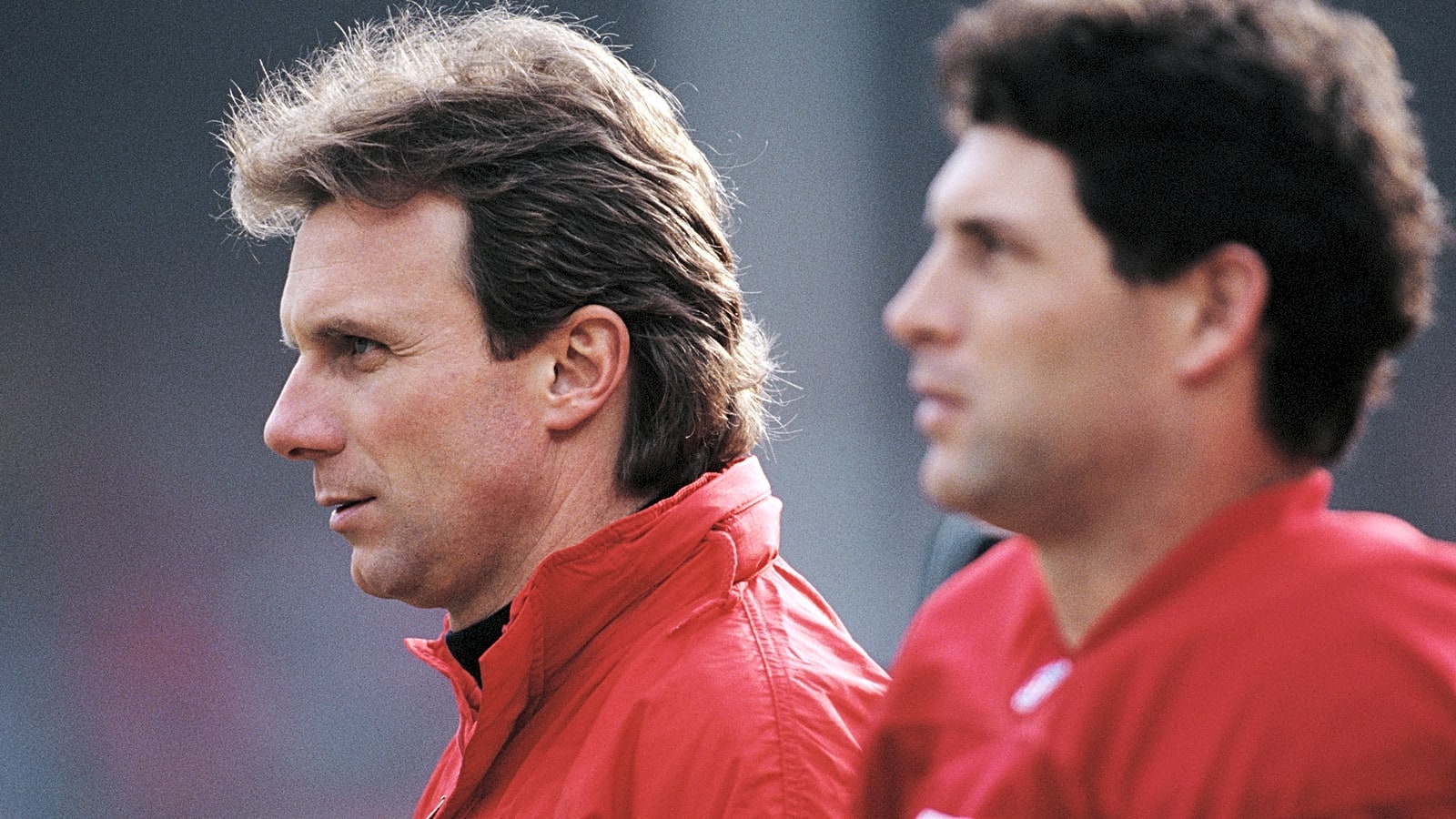
 +
+
